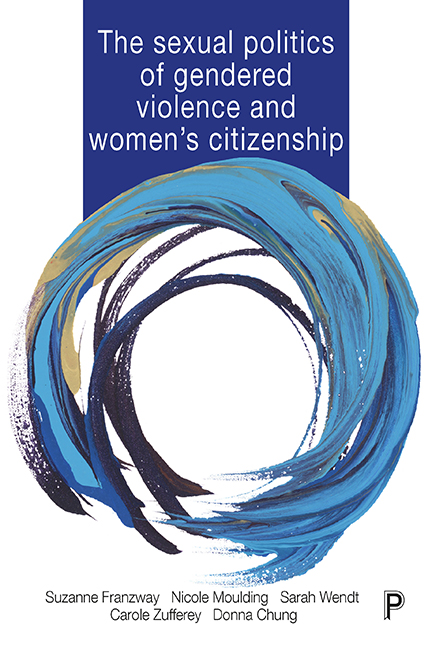Book contents
- Frontmatter
- Contents
- List of tables and figures
- Notes on authors
- Acknowledgements
- one The sexual politics of gendered violence and women’s citizenship
- two Problems of citizenship, violence and gender
- three Challenges of researching gendered violence
- four Living the connected effects of violence
- five Gendered violence and the self
- six Re-engaging lives
- seven Campaigns for women’s freedom from violence
- eight Transforming sexual politics
- References
- Index
two - Problems of citizenship, violence and gender
Published online by Cambridge University Press: 13 April 2022
- Frontmatter
- Contents
- List of tables and figures
- Notes on authors
- Acknowledgements
- one The sexual politics of gendered violence and women’s citizenship
- two Problems of citizenship, violence and gender
- three Challenges of researching gendered violence
- four Living the connected effects of violence
- five Gendered violence and the self
- six Re-engaging lives
- seven Campaigns for women’s freedom from violence
- eight Transforming sexual politics
- References
- Index
Summary
Introduction
Violence against women seems to pervade all societies, even those societies where women have won formal equality with men. Women may have achieved full legal citizenship in most societies, but their rights continue to be damaged by the persistence of violence against them. The first waves of feminists fought hard and for decades to win full citizenship rights for women at the levels of the nation state and of international institutions such as the United Nations (UN). Although gains have been made and gender-based violence has become a visible problem of social and political concern, women do not yet have the substantial equal rights envisaged by the suffragists. In our research, we have puzzled over the apparent failure of women's citizenship rights to protect them from violent male citizens. Together with victims of violence, women in social justice movements, social workers and other support workers, and policy makers, we confront the question of how to tackle the problem of violence against women effectively, in particular its persistent and ubiquitous nature.
In our focus on the impact of violence against women, we recognise citizenship as a site of contested gender relations where there is an ‘on-going struggle with no stopping point’ (Hoffman, 2004: 13). Rather than searching for reasons for gender-based violence within individual psychologies or gendered biologies, we explore the connections between violence, citizenship and gender. While there is no doubt that individuals have unique life stories that contribute to their propensity for engaging in violence or abuse, violence against women is a social, political and cultural phenomenon. We recognise in our own significant data set, as well as in the research literature, that there are clear patterns to the perpetration of violence, its effects on women's rights, and the public and private responses to gender-based violence. These patterns cannot be understood in terms of individual actions, since there is no equivalence between men's violence and women's violence in terms of cause, context, effect or response. And yet, in societies premised on full and equal citizenship for all, it is assumed that all citizens enjoy their rights equally.
- Type
- Chapter
- Information
- Publisher: Bristol University PressPrint publication year: 2018

